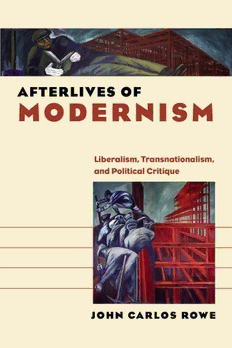
Afterlives of Modernism: Liberalism, Transnationalism, and Political Critique PDF
Preview Afterlives of Modernism: Liberalism, Transnationalism, and Political Critique
afterlives of modernism re-mapping the transnational A Dartmouth Series in American Studies series editor Donald E. Pease Avalon Foundation Chair of Humanities Founding Director of the Futures of American Studies Institute Dartmouth College The emergence of Transnational American Studies in the wake of the Cold War marks the most significant reconfiguration of American studies since its incep- tion. The shock waves generated by a newly globalized world order demanded an understanding of America’s embeddedness within global and local processes rather than scholarly reaffirmations of its splendid isolation. The series Re- Mapping the Transnational seeks to foster the cross-national dialogues needed to sustain the vitality of this emergent field. To advance a truly comparativist understanding of this scholarly endeavor, Dartmouth College Press welcomes monographs from scholars both inside and outside the United States. For a complete list of books available in this series, see www.upne.com. Lene M. Johannessen, Horizons of Enchantment: Essays in the American Imaginary John Carlos Rowe, Afterlives of Modernism: Liberalism, Transnationalism, and Political Critique Anthony Bogues, Empire of Liberty: Power, Desire, and Freedom Bernd Herzogenrath, An American Body|Politic: A Deleuzian Approach Johannes Voelz, Transcendental Resistance: The New Americanists and Emerson’s Challenge John Carlos Rowe A F T E R L I V E S O F M O D E R N I S M Liberalism, Transnationalism, and Political Critique dartmouth college press hanover, new hampshire Dartmouth College Press An imprint of University Press of New England www.upne.com © 2011 Trustees of Dartmouth College All rights reserved Manufactured in the United States of America Designed by Katherine B. Kimball Typeset in Sabon by Passumpsic Publishing University Press of New England is a member of the Green Press Initiative. The paper used in this book meets their minimum requirement for recycled paper. For permission to reproduce any of the material in this book, contact Permissions, University Press of New England, One Court Street, Suite 250, Lebanon NH 03766; or visit www .upne.com Library of Congress Cataloging-in-Publication Data appear on the last printed page of this book. 5 4 3 2 1 Rememory: Lindon Barrett: Friend To borrow from Alex Haley’s Roots (1976), he helped “alleviate the legacies of the fact that preponderantly the histories have been written by the winners.” contents Preface ix Introduction: The Inevitable Intimate Connection 1 part i liberal modernism and transnationalism 1 Naming What Is Inside: Gertrude Stein’s Use of Names in Three Lives 27 2 John Dos Passos’s Imaginary City in Manhattan Transfer 61 3 Faulkner and the Southern Arts of Mystification in Absalom, Absalom! 75 4 Our Invisible Man: The Aesthetic Genealogy of U.S. Diversity 96 part ii postwar liberalism and the new cosmopolitanism 5 Racism, Fetishism, and the Gift Economy in Harper Lee’s To Kill a Mockingbird 121 6 Alien Encounter: Thomas Berger’s Neighbors as a Critique of Existential Humanism 143 7 Buried Alive: The Native American Political Unconscious in Louise Erdrich’s Fiction 163 8 Neoliberalism and the U.S. Literary Canon: The Example of Philip Roth 187 Bibliography 209 Index 219 preface All the chapters in this book were published previously as scholarly essays between 1983 and 2010. Three of the chapters were published outside the U.S. in Germany (chapter 2), Australia (chapter 7), and Italy (chapter 8) and thus have had little circulation in the U.S. The origins of most of these essays bear upon the central argument of the book and on my own cultural politics. All of the original essays, except for the essay on Ger- trude Stein, were commissioned by editors of journals or books, usually on specific authors and in some cases specific texts. It is fair to conclude that these editors approached me because they considered my previous work to qualify me to write about these authors and texts. Some editors undoubtedly judged me to be a liberal capable of writing on liberal au- thors and texts. Others explicitly asked me, as Alice Hall Petry did when commissioning my essay on Harper Lee’s To Kill a Mockingbird, to write a leftist interpretation of a liberal text. Alice was kind enough to express her admiration of my essay on Kate Chopin’s The Awakening, which is a materialist analysis of the socio-economic relations in that novel.1 Dangerous as it is to judge one’s own political or scholarly perspec- tive, I identified myself as a leftist while writing all of these essays, except for the 1983 essay on Thomas Berger, which has been extensively revised for this book, in part because of the dated qualities of the original essay. I certainly began my scholarly career as a liberal, who wrote about pri- marily canonical, white male authors. Henry Adams and Henry James were the subjects of my first published book, Henry Adams and Henry James, an early example of the relevance of Continental deconstruction to American literature.2 In the 1970s deconstruction was considered a radical philosophy, but its political significance was contested. During the Culture Wars of the late 1980s and early 1990s, neoconservatives
